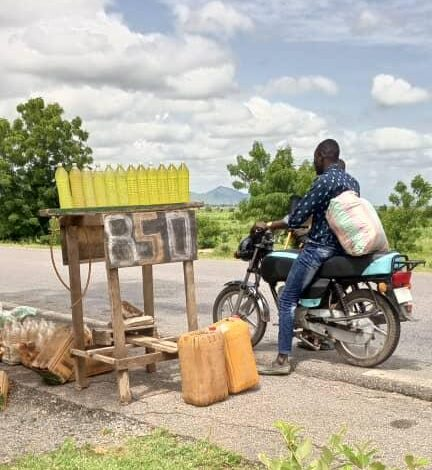Transport fares and food costs are increasing in Garoua North Cameroon, as the removal of oil subsidies by the Nigerian government wipes out the difference in price of smuggled petrol, brought in by canoe from Nigeria.
The cost of living crisis sweating Nigeria has also hit neighbouring Cameroon.
The Nigerian government’s removal of the subsidy it placed on imported petrol has, at a stroke, demolished the black market for smuggled fuel in Cameroon’s northern regions.
Now Cameroonians are beginning to feel the pinch as prices begin to rise.
The removal of the subsidy and the collapse of the black market underline exactly what was happening to a great deal of the subsidised petrol Nigeria was importing. It was being shipped over the border and sold in neighbouring states.
But now, inhabitants of Garoua say the price of food has significantly increased. Commercial motorbike riders have doubled transport fares, increasing the cost of one of the most-used means of transportation in the area. The cost of transporting goods has also increased.
Nigerian President Bola Tinubu, during his inaugural speech in May, said Nigeria’s fuel subsidies would be scrapped, quoting budgetary concerns. The decision led to a steep rise in fuel prices and widespread panic-buying.
Villages and towns in Cameroon who have depended on Nigerian fuel for years, are now facing the consequences.
In northern Cameroon the price of a bottle of fuel from Nigeria, popularly called “zoua-zoua”, went from $0.60 to $1.4 and even almost tripling to $1.6 in some places.
This pushed some commercial bike riders to stage a protest in June. Some bus companies have been unable to refuel their vehicles, leaving many people stranded.
How Nigerian Fuel Gets To Garoua
There are no reliable figures for the amounts of fuel smuggled out of Nigeria. But it is estimated that more than a third of the 66 million litres a day the NNPC ships from its depots could have gone over a border to be sold in a neighbouring state that doesn’t subsidise their citizen’s fuel costs.
There are two routes used by dealers to transport fuel from Nigeria into Cameroon.
Dealers use motorised dug out canoes called pirogues to transport barrels of fuel to the Benoué bridge, at the entrance to the town of Garoua, where it is loaded into illegal fuel stores.
The other path is on land. Trucks are filled with barrels and transported through the Gashi-Gua road with the complicity of forces of law and order in both countries.
One of the dealers, says he has a dealer Benoué who delivers fuel to him through a trusted source.
“There are times when control is very strict but we always find a way to negotiate with the guys(custom officials)”, said Mahamat Abubakar.
But the economic logic of the project was diminishing, he said.
“Even the profit we used to make from selling this is no longer worth it. You buy for $1.01 to sell at $1.34. Added to this there’s custom, the BIR[Rapid Intervention Battalion) and other problems on the way”, he added.
Despite the increase, Aliou Seli says inhabitants have no choice than to buy since they depend on Nigerian fuel.
He expressed worry over the fact that fuel increment directly affects the prices of food items in the market, making life difficult for most of them, especially those in the interior parts of the Northern region.
Selling the fuel is illegal in Cameroon, but it is openly available across the city of Garoua. The Northern regions of Cameroon hugely depend on fuel from Nigeria due to low existence of filling stations in these areas.
“Most often they don’t even have it. We buy from our brothers(Nigerians). Sometimes when you go there, they sell more of cooking gas than fuel,” said a commercial bike rider Ismael
According to Cameroon Petroleum Depot company (SCDP), the country lost out on over $53 million in revenue every year due to smuggling.

